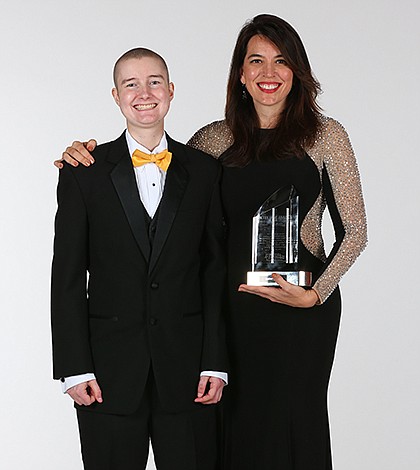- January 16, 2025
-
-
Loading

Loading

The four national finalists for the Fourth Annual Betty Jane France Humanitarian Award included Daniel Notlemeyer, left, Tammy Anderson-Lee, Amber Larkin and Chris McElwee.
— The foundation, led by Windermere resident Amber Larkin, was a finalist for the Betty Jane France Humanitarian Award.
Amber Larkin considers herself a winner, even if she wasn’t awarded the $100,000 grand prize from the NASCAR Foundation. The Windermere resident was one of four finalists for the Betty Jane France Humanitarian Award and was in Las Vegas last week for the announcement.
Larkin is the founder of Noah’s Light Foundation, in Winter Garden, named for her 8-year-old son who died of pediatric brain cancer two years ago. As a finalist, she received $25,000 for her organization.
The big winner was Daniel Noltemeyer, representing Best Buddies Kentucky, who took home the top monetary prize and a 2015 Toyota Camry. The other two finalists were Tammy Anderson-Lee, representing the Autism Society San Diego, where she has developed adaptive swimming programs for children with autism; and Chris McElwee, of Pennsylvania, founder of Michael’s Way, which provides financial assistance to families dealing with expenses resulting from children’s cancer.
REWARDING EXPERIENCE
Larkin traveled to Las Vegas on Dec. 3 with Molly Piveral and Donna Caruso, two members of the Noah’s Light staff. Once there, they met three more members of their party: Drew Davidson and his parents, Karen and Glenn, of Birmingham, Alabama. Drew is fighting the same brain cancer that killed Noah.
That evening, a VIP reception was held for the finalists and their guests with the 16 top NASCAR drivers participating in the Sprint Cup Series. The finalists shared their stories with the drivers and took photos with them.
Larkin recalled a highlight of the evening was when the Davidson family met driver Michael Waltrip. When he found out he was a favorite of the Davidsons’ daughter, who was unable to attend the event, he grabbed a phone and called her.
France, known for her philanthropy work, met the finalists, and Larkin said she was “just absolutely lovely and dear and an amazing woman.”
Thursday morning was dedicated to press interviews at the local Fox station, and then the finalists enjoyed a luncheon with the drivers. Afterward, everyone went down to the Vegas Strip, which was closed off for the NASCAR Victory Lap. Drivers sped down the street and performed burnouts for the crowd.
Friday night was the red-carpet event — the awards ceremony and announcement of the winner.
“The event was wonderful,” Larkin said. “The way I look at it is we are all winners. It was great exposure. It just showed what a big heart NASCAR has.”
NEW PROTOCOL
While Larkin was in Vegas, Suzanne Nixon, executive director of Noah’s Light Foundation, was at the University of Texas MD Anderson Cancer Center, in Houston, meeting with doctors involved in the new NOAH (New Opportunities Advancing Hope) Protocol.
“They are running tests to confirm what is called good manufacturing processes, or GMP,” she said. “They make sure that everything is exactly perfect so there’s no question when they grow the child’s NK cells.”
Larkin has explained NK cells this way: They are “natural killer” cells found in the immune system. They are the most aggressive white blood cells and actually reach out and touch cells — with tentacles — seeking out bad ones.
After talking extensively with Larkin three years ago while Noah was still fighting cancer, Dr. Laurence Cooper, of MD Anderson, agreed to change his lab’s course of research and apply personalized immune-based NK cell therapy to pediatric brain cancer.
The doctor and his lab have been able to take an individual’s NK cells, strip them of their hunting ability, feed them that person’s cancer, reprogram them to hunt only that, put them back in the patient’s body and let them hunt.
“No radiation, no chemotherapy, no toxicity,” Larkin said. “Dead cancer cells by our immune system.”
The U.S. Food and Drug Administration approved this protocol in October. Nixon said doctors are anticipating enrolling three children in the program the first week of January. Three more children will be enrolled if the trial appears to be working. The next step would be phase two of the trial, when the treatment is expanded to hundreds, Nixon said. It could also be expanded to other pediatric cancers.
Larkin and her Noah’s Light Foundation are on a crusade to raise funds for phase two — about $10 million.
“If that goes well, it becomes phase three, or first line of defense, which means it works and ensures that companies will come in and support us,” Nixon said.
Contact Amy Quesinberry Rhode at [email protected].